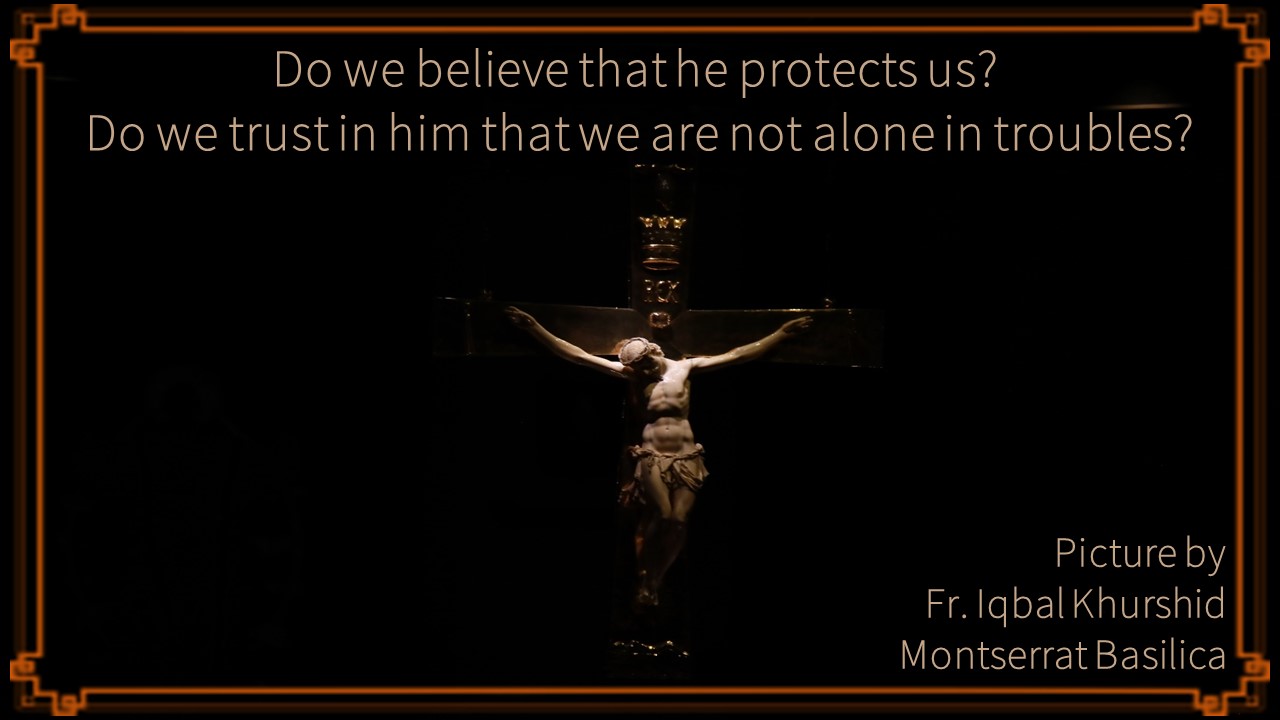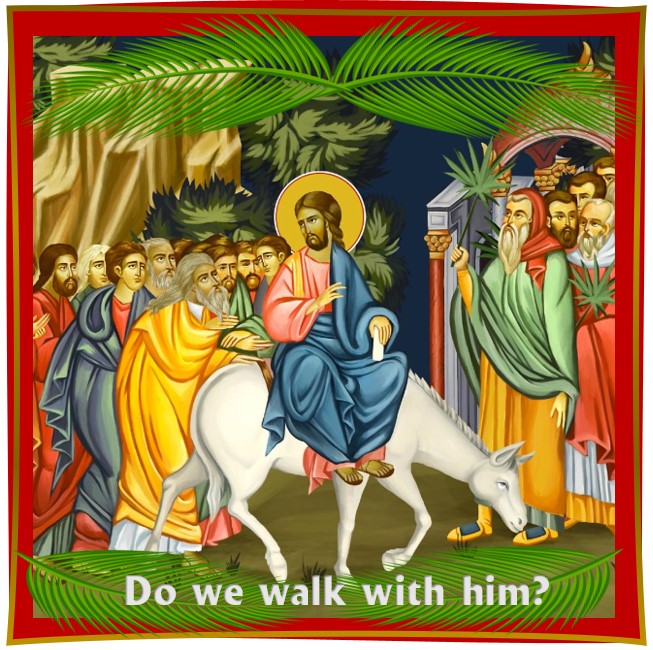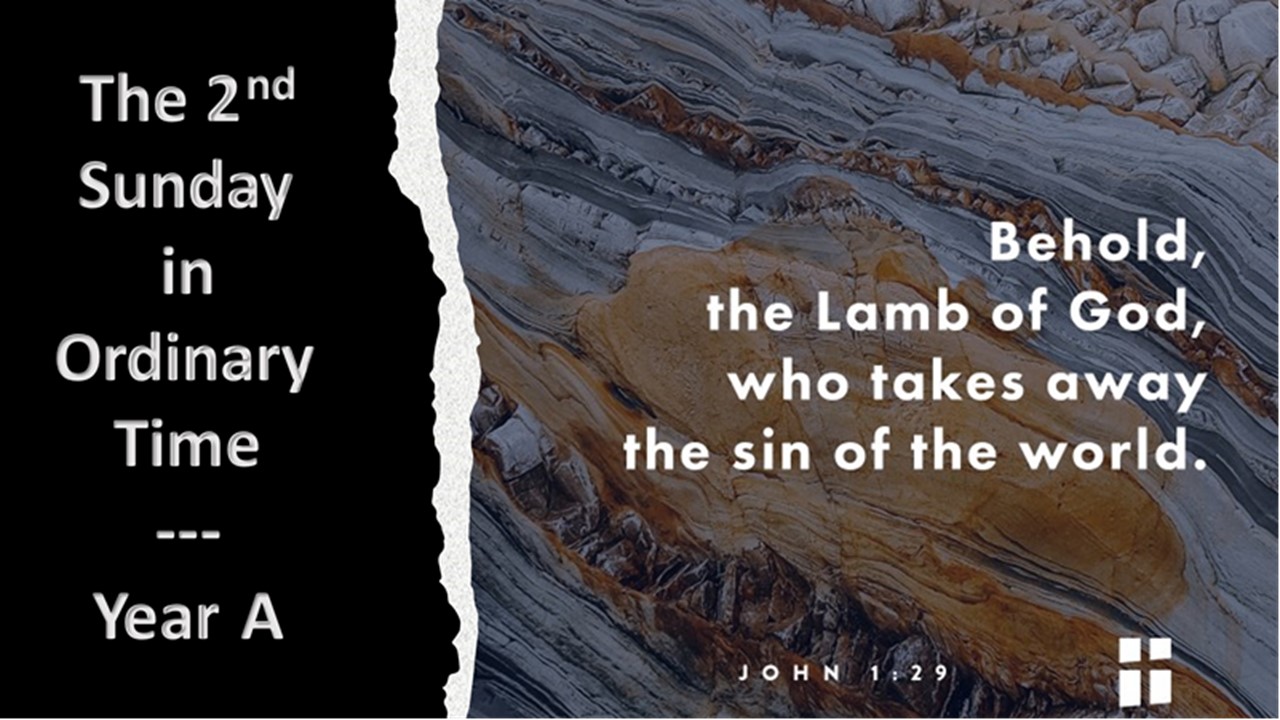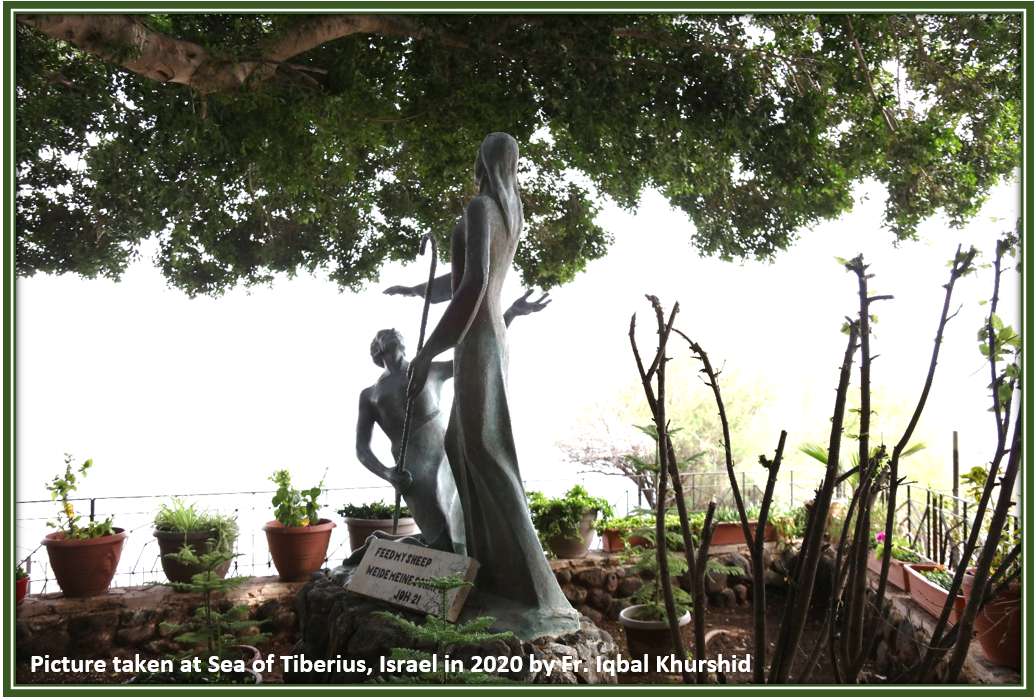
12th Sunday in Ordinary Time Year A ~ June 25, 2023
HE PROTECTS US
During World War II, a US Marine was separated from his unit on a Pacific Island. The fighting had been intense, and in the smoke and the crossfire, he had lost touch with his comrades. Alone in the jungle, he could hear enemy soldiers coming in his direction. Scrambling for cover, he found his way up a high ridge to several small caves in the rock. Quickly he crawled inside one of the caves. Although safe for the moment, he realized that once the enemy soldiers looking for him swept up the ridge, they would quickly search all the caves and he would be killed. As he waited, he prayed, “Lord, if it be your will, please protect me. Whatever your will though, I love you and trust you. Amen.”
After praying, he lay quietly listening to the enemy begin to draw close. He thought, “Well, I guess the Lord isn’t going to help me out of this one.” Just then he saw a spider begin to build a web over the front of his cave. As he watched, listening to the enemy searching for him all the while, the spider layered strand after strand of web across the opening of the cave. “Hah” he thought, “what I need is a brick wall and what the Lord has sent me is a spider web. God does have a sense of humor.” As the enemy drew closer, he watched from the darkness of his hideout and could see them searching one cave after another. As they came to his, he got ready to make his last stand. To his amazement, however, after glancing in the direction of his cave, they moved on. Suddenly, he realized that with the spider web over the entrance, his cave looked as if no one had entered it for quite a while. “Lord, forgive me,” prayed the young man, “I had forgotten that in you a spider’s web is stronger than a brick wall.”
There are three people in the whole Bible who have wished death over their lives due to severe suffering they faced. First is Job who was righteous but wealthy man and he lost everything. Even his own family members scolded him and forced him to blaspheme God and died and his pain so crucial that he wished that he would die rather than to live. Second person is Prophet Jeremiah who was called to be the prophet and messenger from his mother’s womb. However, he suffered a lot for standing for the truth that he wished to be dead and cursed the day he was born. Third person we see is Prophet Jonah who was trying to escape from God, but he was saved by the whale, but then the time came when he wished to die rather than to live. I believe many times we have similar circumstances where we wish to discontinue living because our suffering and pain is beyond our strength (please read 1 Corinthians 10:13 to find the answer to our suffering).
Is suffering everything in our life? Why do are we fearful of everything happening in our life? I know no one wants to suffer or have difficult times because we all desired an easy and peaceful life but most of the time, we forget that “life is not a bed of roses” but a struggle. Then is what should be our attitude towards the above mentioned two questions?
To reflect on the four possible attitudes with which one may deal with difficult situations would do us good. The first attitude is illustrated by the “slowness” of Lot’s reaction when the angel tells him to leave the city, before the destruction of Sodom and Gomorrah. He was determined to leave, but when the time came, he was cautious and “lingered”, even when the angel had urged him to flee. It is very hard to cut ties with a sinful situation. It is hard!… But the voice of God tells us this word: Flee! You cannot fight here, because the fire, the sulphur will kill you. Flee! The angel told him: Flee for your life, do not look back, go forward.
Secondly, we must let things go and trust in the Lord. The Exodus of the People of God in the desert had everything, promises of the Lord, everything, and yet they continued to have nostalgia for the “onions of Egypt”, forgetting that they had eaten them on “the table of slavery”. The angel’s advice is wise: Do not look back! Keep going! We must leave behind all nostalgia because there is also the temptation of curiosity…. We must flee and not look back, for we are all weak and must protect ourselves. But sometimes as some one said “Moses brought Israelites from Egypt but couldn’t get Egypt out of them” we have the same problem that we do trust in the Lord but can not let fear vanish from our lives because we love to hang on to it.
Thirdly we must look at Jesus who is standing up for us. When there is a storm at sea, waves swamp the boat. “Save us, Lord, we are perishing!” they say. Fear is also a temptation of the devil: to be afraid to continue the Lord’s path. Fear, however, is not a good counsellor. Jesus said so many times: “Do not be afraid’”.
The fourth attitude “is the grace of the Holy Spirit”. When Jesus calms the sea, the disciples on the boat are filled with awe. When faced with sin, nostalgia, fear we must always “look at the Lord” and “contemplate the Lord”. We must say: “Save us Lord, we are perishing”. Yes, we are weak, but we must be courageous in our weakness.
I think we can walk with Prophet Jeremiah who is not only mentioning about people who are around him to destroy his life but also his trust in the Lord who has the power to save him; “But the Lord is with me like a dread warrior, therefore my persecutors will stumble, for they will not succeed. Their eternal dishonour will never be forgotten”. In this scripture, we find Jeremiah in deep weeds. He is being persecuted because of his message. Seems not everybody wanted to hear it, wanted to change their ways. In the gospel, Jesus is giving instructions to his disciples on their mission going forward. Interesting words: “Don’t be afraid of those who can kill the body…” Not what you want to hear when you set out on a mission! That doesn’t seem to promise well. Again, it seems like sharing the message might be dangerous…especially if the message asks hearers to change their ways. Jeremiah and the disciples were entrusted with a message: The Lord hears the cry of the poor. God considers each and every life valuable, even a sparrow. It is the message I am entrusted to live, to share, to facilitate, not only in my personal life but in society, with all that implies for health care, housing, employment, education…every facet of public life.
God protects in our difficult times and provides us we need through his people. I was inspired by this story, and I love to share it with you which is by an unknown author, it’s worth the read and to believe that God does not leave us alone in our suffering and fear.
I was driving home from work when my car started to choke and sputter and died.
I barely managed to coast, cruising, into a gas station, glad only that I would not be blocking traffic on the highway and would have a somewhat warm spot to wait for the tow truck. It wouldn’t even turn over. Before I could make the call, I saw a woman walking out of the “quickie mart” building, and it looked like she slipped on some ice and fell into a gas pump! So, I got out to see if she was okay. When I got there, it looked more like she had been overcome by sobs than that she had fallen. She was a young woman who looked haggard with dark circles under her eyes. She dropped something as I helped her up, and I picked it up to give it to her. It was a nickel.
At that moment, everything came into focus for me: the crying woman, the ancient Suburban crammed full of stuff with 3 kids in the back (1 in a car seat), and the gas pump reading $4.95. I asked her if she was okay and if she needed help, and she just kept saying “I don’t want my kids to see me crying,” so we stood on the other side of the pump from her car. She said she was driving to California and that things were very hard for her right now.
So, I asked, “And you were praying?” That made her back away from me a little, but I assured her I was not a crazy person and said, “He heard you, and He sent me.”
I took out my card and swiped it through the card reader on the pump so she could fill up her car completely, and while it was fueling, walked next door to McDonald’s and bought 2 big bags of food, some gift certificates for more, and a big cup of coffee. She gave the food to the kids in the car who attacked it like wolves, and we stood by the pump eating fries and talking a little.
She told me her name and that she lived nearby. Her boyfriend left 2 months ago, and she had not been able to make ends meet. She knew she wouldn’t have money to pay the rent January 1st, and finally, in desperation, had called her parents, with whom she had not spoken in about 5 years. They lived in California and said she could come live with them and try to get on her feet there.
So, she packed up everything she owned in the car. She told the kids they were going to California for Christmas but not that they were going to live there.
I gave her my gloves and a little hug and said a quick prayer with her for safety on the road. As I was walking over to my car, she said, “So, are you like an angel or something?”
This made me cry. I said, “Sweetie, at this time of year, angels are really busy, so sometimes God uses regular people.”
It was so incredible to be a part of someone else’s miracle. And of course, when I got in my car, it started right away and got me home with no problem. I’ll put it in the shop tomorrow for a check, but I suspect the mechanic won’t find anything wrong.
In this Sunday’s Gospel, the invitation Jesus addresses to His disciples resonates: to have no fear, to be strong and confident in the face of life’s challenges, as He forewarns them of the adversities that await them. Today’s passage is part of the missionary discourse, with which the Teacher prepares the Apostles for their first experience of proclaiming the Kingdom of God. Jesus persistently exhorts them “not to be afraid”, “do not be afraid”, and Jesus describes three tangible situations that they will find themselves facing.
First and foremost, the first, the hostility of those who would like to suppress the Word of God by sugar-coating it, by watering it down or by silencing those who proclaim it. In this case, Jesus encourages the Apostles to spread the message of salvation that He has entrusted to them. For the moment, He has transmitted it cautiously, somewhat covertly within the small group of the disciples. But they are to utter His Gospel “in the light”, that is, openly; and are to proclaim it “from the housetops” – as Jesus says – that is, publicly.
The second difficulty that Christ’s missionaries will encounter is the physical threat against them, that is, direct persecution against them personally, to the point of being killed. Jesus’s prophesy is fulfilled in every age: it is a painful reality, but it attests to the faithfulness of the witnesses. How many Christians are persecuted even today throughout the world! They suffer for the Gospel with love, they are the martyrs of our day. And we can say with certainty that there are more of them than the martyrs of the early times: so many martyrs, merely for the fact of being Christians. Jesus advises these disciples of yesterday and today who suffer persecution: “do not fear those who kill the body but cannot kill the soul”. There is no need to be frightened of those who seek to extinguish the evangelizing force with arrogance and violence. Indeed, they can do nothing against the soul, that is, against their union with God: no one can take this away from the disciples, because it is a gift from God. The only fear that a disciple should have is, to lose this divine gift, this closeness to and friendship with God, to stop living according to the Gospel, thereby experiencing moral death, which is the effect of sin.
The third type of trial that Jesus indicates the Apostles will find themselves facing is the sensation, which some may feel, that God Himself has abandoned them, remaining distant and silent. Here too, Jesus exhorts them not to fear, because even while experiencing these and other pitfalls, the lives of the disciples’ rest firmly in the hands of God, who loves us and looks after us. They are like the three temptations: to sugar-coat the Gospel, to water it down; second, persecution; and third, the sensation that God has abandoned us. Even Jesus suffered this trial in the garden of olives and on the cross: “Father, why have you forsaken me?”, says Jesus. At times one feels this spiritual dryness. We must not be afraid of it. The Father takes care of us because we are greatly valued in His eyes. What is important is the frankness, the courage of our witness, of our witness of faith: “recognizing Jesus before others” and continuing to do good. (Please read Rev. 21:1-5)
She hired a plumber to help her restore an old farmhouse, and he had just finished a rough first day on the job: a flat tire made him lose an hour of work, his electric drill quit, and his ancient one-ton truck refused to start. While she drove him home, he sat in stony silence. On arriving, he invited her in to meet his family. As they walked toward the front door, he paused briefly at a small tree, touching the tips of the branches with both hands.
When opening the door, he underwent an amazing transformation. His tanned face was wreathed in smiles, and he hugged his two small children and gave his wife a kiss.
Afterward, he walked back to the car. They passed the tree, and her curiosity got the better of her. She asked him about what she had seen him do earlier. “Oh, that’s my trouble tree,” he replied. “I know I can’t help having troubles on the job, but one thing’s for sure; those troubles don’t belong in the house with my wife and the children. So, I just hang them up on the tree every night when I come home and ask God to take care of them. Then in the morning, I pick them up again. Funny thing is,” he smiled, “when I come out in the morning to pick ’em up, there aren’t nearly as many as I remember hanging up the night before.”
Do we believe that he protects us? Do we trust in him that we are not alone in troubles?
Other Sermons In This Series

Palm Sunday (6th Sunday of Lent) Year A ~ March 26, 2023
March 31, 2023

2nd Sunday in Ordinary Time ~ Year A ~ January 15, 2023
January 13, 2023

3rd Sunday of Easter Year C ~ Sunday, May 1, 2022
April 29, 2022

